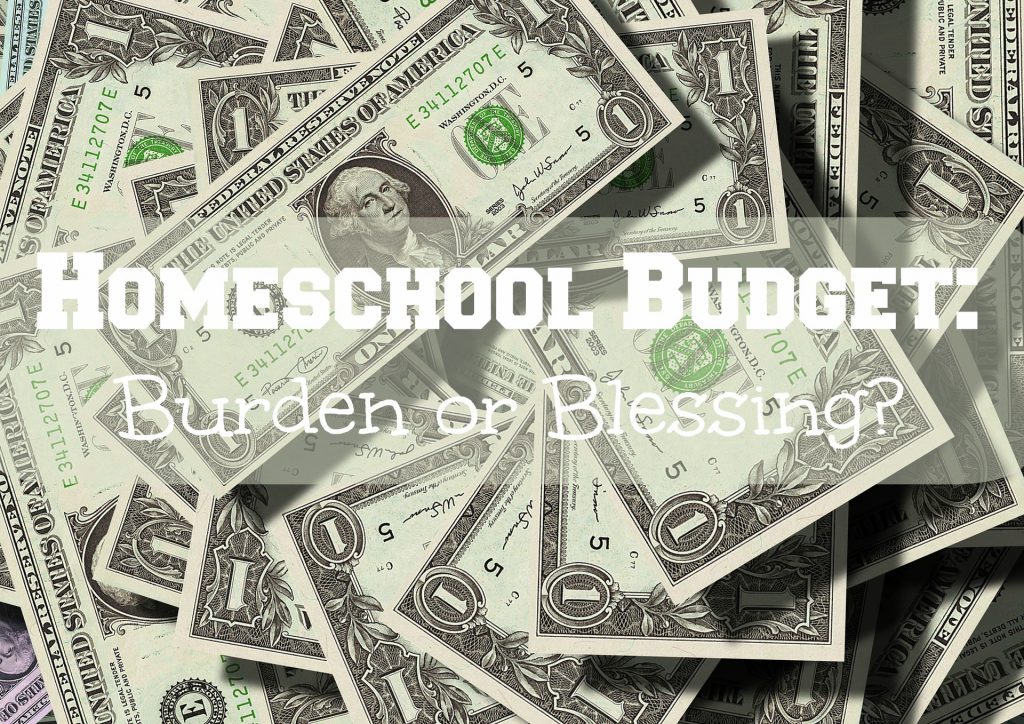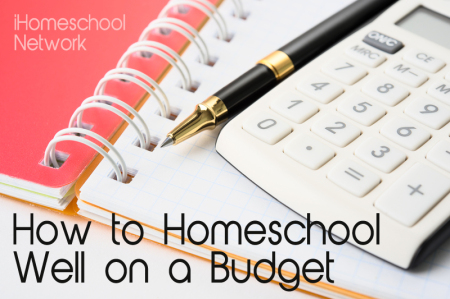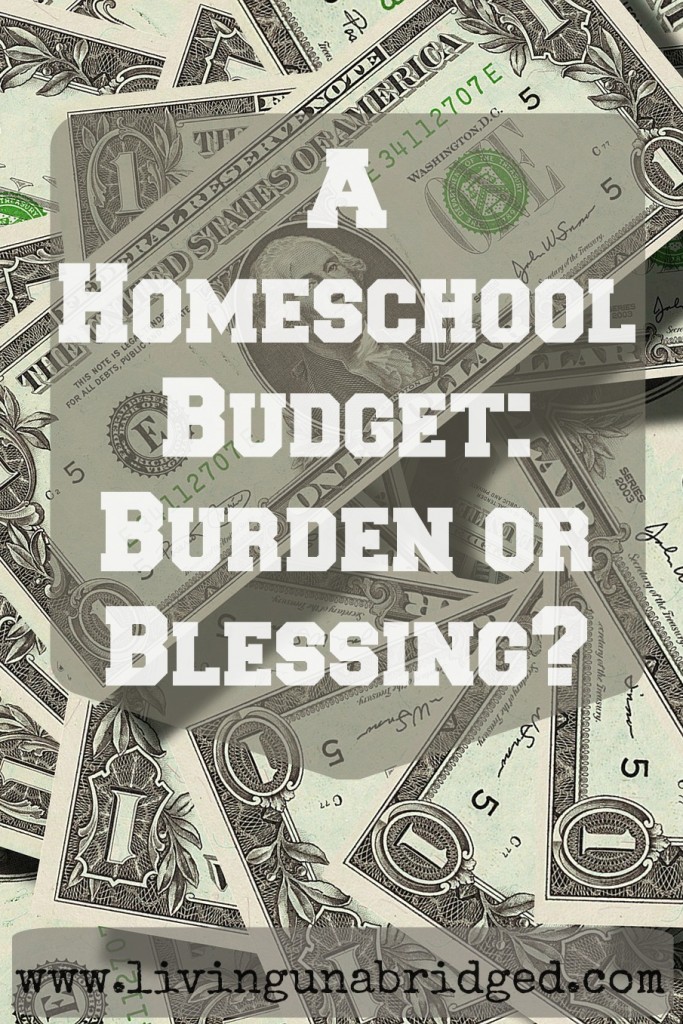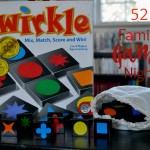Some people think "budget" is a bad word. Maybe you recoil at the idea of a sheet of paper telling you what to do.
But a budget doesn't have to mean the same thing as a burden. A budget can be a freeing thing. Instead of wondering how you're doing, if you've gone over, and how much room you have, you will know.

Your Homeschool Budget is a Tool
Knowledge is empowering and a budget is the knowledge of how much of a currently finite resource (your income) can be spent on a potentially limitless purchase (CURRICULUM!). The temptation for homeschool moms is often the idea that another curriculum or another purchase will be just the thing that fixes the problems in our homeschool.
Unfortunately, that's not always true. So you can be many dollars poorer and still have the problem. A budget helps solve this because, when the money is gone, it's gone and now it's time to get creative.
Here's how my husband and I have set our homeschool budget. We consider the following things:
- How many children we have who will need books, curriculum, manipulatives, etc.
- How many of our current supplies can be reused
- What changes we've been considering (Is something just not working? Have my friends strongly suggested an alternative?)
- How much money can we squeeze out of our regular budget
Those factors will be different for each family, of course.
 Once you have a dollar amount, how can you stretch your homeschool dollars?
Once you have a dollar amount, how can you stretch your homeschool dollars?
- Borrow - before buying a pricey curriculum ask other homeschoolers if you can borrow it. No point in wasting your money if it isn't going to work for your child. Some families can swap curriculum ("You can borrow our Saxon 3 while we borrow your Saxon 54") each year.
- Trade - similar to the borrowing scenario, only you don't have to remember to give the item back at the end of the year.
- Shop Used Curriculum sales - almost every homeschool group sets up one of these at least once a year. There are also Facebook groups for selling used curriculum. If you can't find one, don't forget about eBay, Craigslist, and good old-fashioned yard sales. I've found puzzles, maps, and mint condition math manipulatives at yard sales. You never know what you'll find, so keep looking!
- Ask for Gifts - things like art sets, Science kits, museum or zoo passes or special classes make great gifts. If you keep a running list of these type of items you'll have it ready when grandparents or other family members ask what a child would like for Christmas or a birthday.
- Focus on reusable curriculum - many curriculums allow you to copy for family use. These materials can be better values for larger families than consumable curriculum.
- Simplify - curriculum is usually a homeschool mom's achilles heel. They all look promising. We know people who love them. We think, "If I had that, maybe my child would enjoy that subject instead of hating it." Maybe. Maybe not. One thing all textbooks and resources have in common: they have to be used or put into practice to work. It's not a value if it just ends up sitting on a shelf.
- Online resources - there are so many great unit studies, printables, and book lists available online. I have entire Pinterest boards dedicated to these. Before you buy something, do a quick search to see if someone has put together a free or inexpensive similar option.
- Make your own - here's a fundamental truth about homeschooling: you know your child(ren) better than anyone else does. Many of the curriculums available to purchase today were put together by homeschool moms or dads in an effort to help their own children. You don't have to be a creative genius (and you don't have to fix it up for sale or use by others) but you do know your child and what s/he needs.
- Use your library - the library is your best friend, whether we're talking about books (do look into getting an educator card) or special programs (Candy Chemistry, anyone? My kids went to that one last year and loved it.) or online resources or tutoring or opportunities to volunteer, your local library has something for everyone.
- Prioritize experiences - curriculum comes and goes. Experiences will be remembered. Keep a portfolio of your field trips (and honestly, many different things can count as field trips). Reading about polar bears can be fun. Watching polar bears swim at the zoo will be unforgettable.
- Organize - it won't do any good to save that Saxon textbook for the next student if you aren't able to find it when that student gets old enough. Be as organized as you need to be, not to some other homeschool mom's standard.
- Rely on good books - whether hardback, paperback, or on a Kindle or Nook, you can't beat books for value.
- Know your limits - what I mean by this is know your strengths. If Math was never your thing, you may appreciate a pricier computer based math curriculum that teaches your child. Maybe you have a budding scientist, so you may need to set aside money so that student can have a biology or chemistry lab in a co-op setting. If you don't feel comfortable teaching a particular subject you can hire a tutor, but make sure your budget reflects that expense.
- Don't forget incidentals - we spend a hefty amount on ink cartridges, printer paper, and other office supplies. Even "Free" resources will probably have to be printed out and maybe even bound or stapled together.
- Keep your eyes open - have you ever been walking down a grocery store aisle and seen a deal on art supplies or a novelty that would make a perfect addition to your math manipulatives? I have. You never know where you might find "school supplies".
- Pass it on - when you're done with a school item, either sell it in a used curriculum sale or pass it on to a friend. I have never regretted passing on something that didn't work for us. Other homeschool families have passed their items to us. It's kind of like a huge circle and generous spirits keep it turning.
- Wait - sometimes it's just not in the budget to buy a particular resource or sign up for a particular course. Wait and see what happens. Maybe you can set aside money to pursue that option next year. Or maybe you'll hear about a cheaper alternative. An online option might open up. Maybe what you perceive as a crisis in your homeschool will pass and you won't even need that item any more. So much can happen. Greet these challenges with a creative spirit and the budget won't feel like a burden.
Do you homeschool on a budget? What are your favorite tips for thriving on a budget?
Budget friendly resources for homeschoolers:

This post is part of this link-up from iHN. To see homeschool budget tips please visit my fellow iHN bloggers here:













Budget can be a scary word but thank you for reminding me how freeing it truly is to adhere to a budget. I know that when my husband and I are diligent about budgeting we always always find extra money.
Great ideas on finding ways to squeeze the most out of the money you have set aside for homeschooling. Simplify is my favorite, it is so easy to get caught up.
It is SO easy to be caught up in curriculum fever! Even with all the free things my family and friends have handed down to us, I've had to start simplifying and passing on what we're just not going to get around to using or what doesn't work for us for whatever reason.
For the first few years of my homeschool journey, I did things VERY cheaply. As my son is getting older, I'm slowly seeing the need to spend a bit of money on reliable curriculum that doesn't take all my energy to put together. I definitely agree about getting things that can be reused!
[…] A Homeschool Budget: Burden or Blessing? :: Living Unabridged […]
[…] Homeschool Budget: Burden or Blessing? by Living, Unabridged […]
[…] considerations in mind, Karen at Living Unabridged offers thoughtful tips in her blog – Homeschool Budget: Burden or Blessing? Karen says: “Budget” doesn’t have to be synonymous with “Burden”. […]